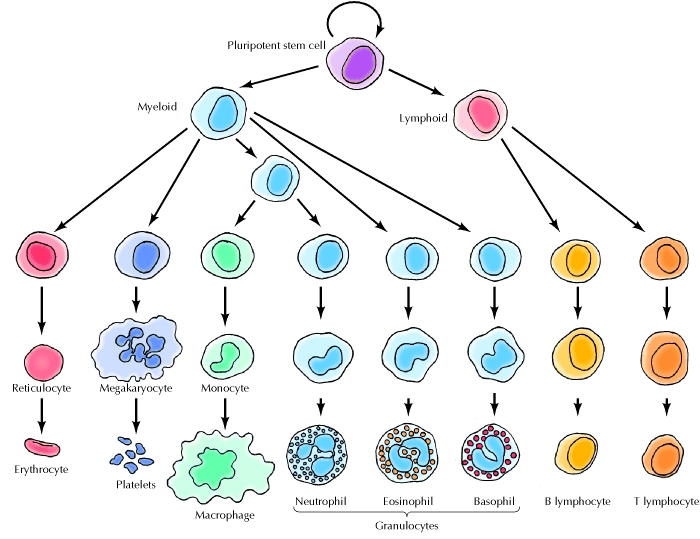They lose the ability to differentiate and become cancer cells because genes that are in charge of checkpoints are damaged. Checkpoints are prominent throughout interphase, they control the cell cycle. Such defective differentiation is closely coupled to abnormal proliferation, since most fully differentiated cells either cease cell division or divide only rarely. Rather than carrying out their normal differentiation program, cancer cells are usually blocked at an early stage of differentiation, consistent with their continued active proliferation.
The leukemias provide a particularly good example of the relationship between defective differentiation and malignancy. All of the different types of blood cells are derived from a common stem cell in the bone marrow (see below). Descendants of these cells then become committed to specific differentiation pathways. Some cells, for example, differentiate to form erythrocytes whereas others differentiate to form lymphocytes, granulocytes, or macrophages. Cells of each of these types undergo several rounds of division as they differentiate, but once they become fully differentiated, cell division ceases. Leukemic cells, in contrast, fail to undergo terminal differentiation (second diagram below). Instead, they become arrested at early stages of maturation at which they retain their capacity for proliferation and continue to reproduce.


Programmed cell death, or
apoptosis, is an integral part of the differentiation program of many cell types, including blood cells. Many cancer cells fail to undergo apoptosis, and therefore exhibit increased life spans compared to their normal counterparts. This failure of cancer cells to undergo programmed cell death contributes substantially to tumor development. For example, the survival of many normal cells is dependent on signals from growth factors or from the extracellular matrix that prevent apoptosis. In contrast, tumor cells are often able to survive in the absence of growth factors required by their normal counterparts. Such a failure of tumor cells to undergo apoptosis when deprived of normal environmental signals may be important not only in primary tumor development but also in the survival and growth of metastatic cells in abnormal tissue sites. Normal cells also undergo apoptosis following DNA damage, while many cancer cells fail to do so. In this case, the failure to undergo apoptosis contributes to the resistance of cancer cells to irradiation and many chemotherapeutic drugs, which act by damaging DNA. Abnormal cell survival, as well as cell proliferation, thus plays a major role in the unrelenting growth of cancer cells in an animal.